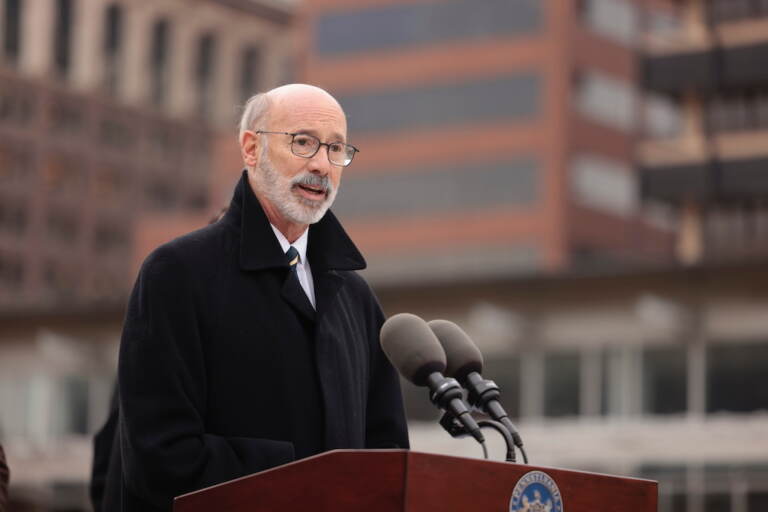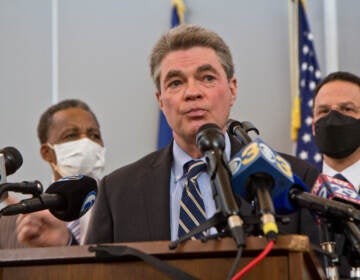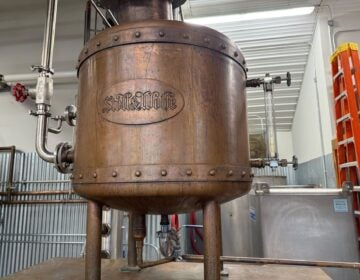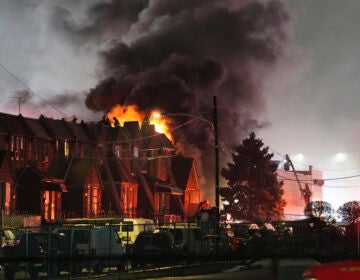Gov. Wolf announces $15M for gun violence prevention to fund community programs
Pennsylvania is using federal stimulus funding to put another $15 million dollars toward violence intervention and prevention programs.

File photo: Gov. Tom Wolf speaking at People’s Park in Philadelphia on December 9, 2021. (Office of Gov.)
Gov. Tom Wolf, joined by Sen. Vincent Hughes and other lawmakers in Philadelphia’s Mill Creek neighborhood, announced a more than $15 million increase in state funding to support gun violence prevention efforts.
The money comes through the Pennsylvania Commission for Crime and Delinquency’s Gun Violence and Intervention program, which initially had $8 million for grants this month.
The extra $15 million announced Thursday, made available through the American Rescue Plan, will also go towards community violence prevention grant programs.
“I am proud to announce an additional $15.7 million dollars of violence intervention and prevention grant funding that has been distributed to community organizations, and I want to point out that that’s community organizations — not some big institution out there somewhere,” Wolf said. “It’s community organizations who know what’s going on on the ground, who can make a difference in their communities.”
Communities across Pennsylvania have seen an increase in shootings and gun violence. In 2021, there were 562 homicides just in Philadelphia. That was up 13% from 2020 and the highest total on record for the city.
Lawmakers pointed out this isn’t just a Philadelphia problem.
“Communities across Pennsylvania have seen an increase in shootings and gun violence — Pittsburgh, York, Reading, Philadelphia, among others,” Wolf said.
The governor and other local lawmakers called on Republican state lawmakers in Harrisburg to join their efforts to provide additional funding to curb violence.
“We all know these investments are simply not enough, and that’s why I am calling on the Republican leaders in the General Assembly to step up and take action to help this work go even further. Gun violence, just like so many forms of systemic inequality, disproportionately harms communities of color and historically marginalized communities,” Wolf said.
He also said he will propose even more support for violence prevention and reduction efforts in the coming months, but to keep building on his initiatives, he asked Republican leaders who prioritize gun rights “to step up to be part of the solution.”
Hughes, echoed Wolf’s sentiments, that the gun violence crisis is a statewide and national problem that isn’t strictly based in, or limited to, Philadelphia.
“You need to understand some of the numbers,” Hughes said. “In Erie, Pennsylvania, the number of confirmed shots fired calls jumped more than 80% … in 2020, and gun homicides were up 60%. The number of stolen firearms recovered in Erie nearly doubled,” he said. “In Cumberland County, homicides doubled in 2020. In State College, they saw a 38% increase in violent crime from 2016 to 2019. That’s before we got to the pandemic.”
One of the possible benefactors of the additional $15 million in grants is ACHIEVEability, a community-based organization that helps homeless single parents with housing, education, and other support services. Jamila Harris Morrison, executive director at the organization said that the grant is still a “drop in the bucket.”
“We can’t keep going like this. We need to have continued investment in the way that you invest in Center City,” Morrison said. “These lives are just as important and you need to understand that gun violence investment, it takes many forms.”
She said community-based programming only works when there is continued investment so her organization can continue to help people stuck in the cycle of crime.
“So we’re grateful for the $50 million, but we need another $45 million when we go into 2023. This is not a one and done, and we’re going to change the city around, but we can’t do it without your help.”
WHYY is your source for fact-based, in-depth journalism and information. As a nonprofit organization, we rely on financial support from readers like you. Please give today.







